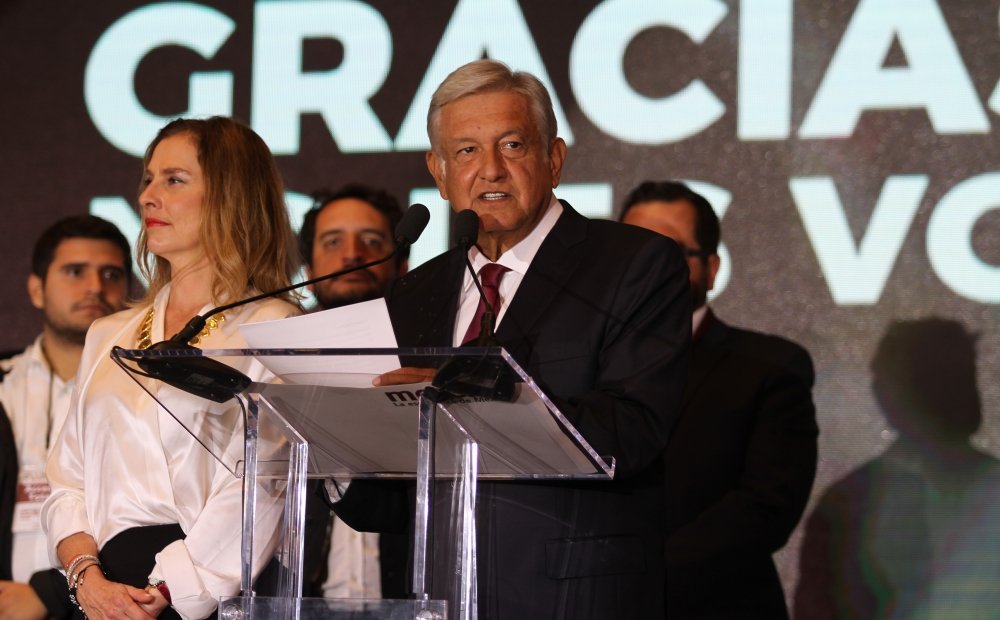Ground Truth Briefing | Assessing AMLO's First Year

As Mexican President Andrés Manuel López Obrador concludes his first year in office, our experts discused the achievements and struggles of the first year of the López Obrador administration. Through the first year of his presidency, AMLO has had a high approval rating and has amassed considerable discretionary powers. However, during his first year Mexico has also faced immigration challenges, trade negotiations, a slowing economy, and rising levels of violence in the country.
In this Ground Truth Briefing on Mexico's economic outlook, experts discussed the migration challenge, security issues, current and future trends in AMLO's public opinion rating, and U.S.-Mexico relations under the López Obrador administration.
Selected Quotes
Duncan Wood, Director, Mexico Institute (Moderator)
“The hope of December 2018. Some of us were fortunate enough to be here in Mexico City in the Zócalo that night, and the sense of optimism, of hope for the future, was really palpable that night. And I think it’s continued. When we look at how Mexican people continue to talk about the presidency, they say they have hope that things will get better in Mexico. For those reasons, I think AMLO has enjoyed an impressive honeymoon period over the past twelve months, despite the fact that there are serious challenges for his administration on the fronts of corruption, violence, energy production, and, of course, raising economic growth.”
Blanca Heredia, Professor, Centro de Investigación y Docencia Económicas (CIDE)
“We’ve had over thirty years of governments that attempted to tackle Mexico’s deep-seeded problems through basically the same set of policies. They worked for some things, essentially for macroeconomic stabilization, and also for modernizing a part of the Mexican economy. Beyond that, however, inequality, social inequality, and social exclusion grew. Violence became rampant. And there was a lot of discontent. And that is where AMLO comes from.”
“During his campaign, he very clearly campaigned against this model of economic growth and social arrangement, so that should not surprise u . He did not, in any sense, campaign for doing that same model or that same project well or adequately. He was very clear that he felt that this, what he termed “neoliberalism”… needed to be dismantled so that Mexico could really begin to address its many problems.”
“So far, we have some elements that are positive, and some elements that are not so positive in the one year [AMLO] been in power formally. On the negative side, I would say… violence has not subsided, and not only that which might have been too much to ask, but what I think’s more concerning, or more worrisome, is that there is no clear security strategy.”
“On the positive side, I’d say that AMLO has really brought to the foreground some of Mexico’s most central problems—namely social inequality and social exclusion—and those have been placed firmly in the center of the government’s agenda, and of Mexico’s public conversation.”
Alejandro Moreno, Public Policy Scholar, Professor of Political Science, Instituto Tecnologico de Mexico (ITAM)
“I have to say that this has been a very challenging start of government, especially because of the expectation that some analysts like Blanca [have] pointed out very well: How is it possible that some objective indicators of performance, such as the economy, or rising levels of crime, are not being reflected in the popularity ratings?
“I think that the polls show many different angles here. One, and the main one, let me just emphasize it, his popularity ratings are comparatively high. When I say comparatively, I’m not only referring to international settings, especially from Latin America, where popularity ratings tend to be quite low for different administrations and presidencies. We haven’t seen that in Mexico, except during the administration of Enrique Peña Nieto. When I say comparatively, I am looking at the other Mexican presidents that we have had the opportunity to follow in terms of public opinion.”
“Popularity ratings during these thirty years are not always tied to indicators of performance … Right now, what we expect, at least, from the expert side, or point of view, that López Obrador’s popularity ratings may go down because of the economic signs of stagnation. I think that we’re expecting something that not necessarily has happened in the past.”
“What I think keeps López Obrador’s ratings very high is that people are not evaluating his performance so far, but they are still hopeful… Many people are still very hopeful; when I say ‘still,’ I commit the possible mistake of thinking this may change, although we don’t know. López Obrador is very effective at mobilizing people, people’s support, popular sentiments, and I think that we will see very interesting interaction between his regular base narrative of his presidency and movement – or lack of movement – of popular sentiment.”
Earl Anthony Wayne, Public Policy Fellow; Advisory Board Co-Chair, Mexico Institute, former Career Ambassador to Afghanistan, Argentina, and Mexico
“I think one word that is good to use in thinking about U.S.-Mexico relations is uncertainty. Both governments have actually done a good job—from some angles—of keeping these relations moving ahead, and not getting into large disagreements. But there has not been a tremendous amount of progress overall, and there remains large degree of uncertainty, and that starts with the USMCA.”
“Ultimately, [USMCA] does have to come down to a decision in the House of Representatives, and by House Speaker Nancy Pelosi; whether she will bring this to a vote. So, in some sense they are very close, but it is unclear how far they are from getting that approval. And so, what that means is the business community, farmers, other thinking about the long-term future, and investing substantially in that North American relationship have been holding off, and so that uncertainty continues.”
“Migration. From the U.S. perspective, this has been the top priority from President Trump’s point of view and, as you all know, this is rooted deeply in his campaign themes. And, in a sense, moving away from the total emphasis on building a physical wall, but having a lot more cooperation with Mexico to stop the migrants who are coming in, especially from Central America…. We did see a surge of family units from Central America.”
Speakers

Professor of Political Science, Instituto Tecnológico Autónomo de México (ITAM); Director of Public Opinion Polling, El Financiero

Former Career Ambassador to Afghanistan, Argentina, and Mexico; Distinguished Diplomat in Residence, School of International Service, American University
Moderator

Hosted By

Mexico Institute
The Mexico Institute seeks to improve understanding, communication, and cooperation between Mexico and the United States by promoting original research, encouraging public discussion, and proposing policy options for enhancing the bilateral relationship. A binational Advisory Board, chaired by Luis Téllez and Earl Anthony Wayne, oversees the work of the Mexico Institute. Read more
